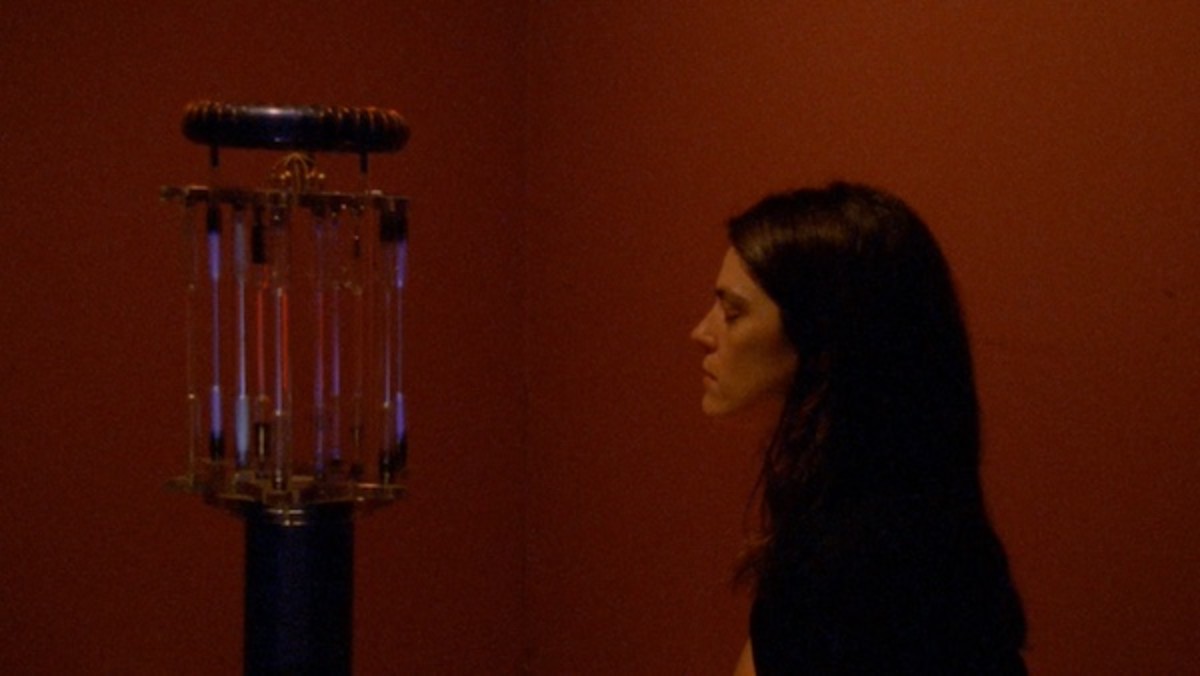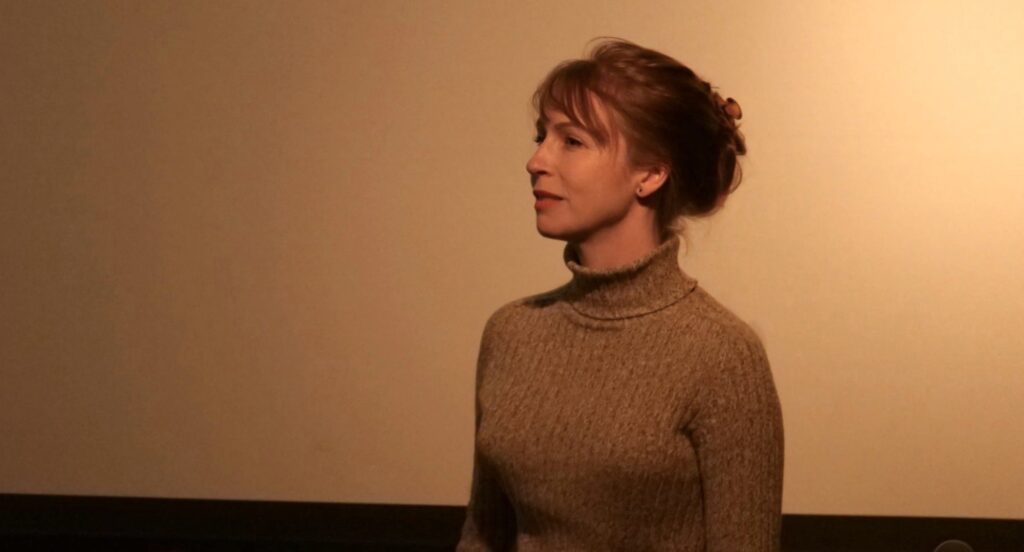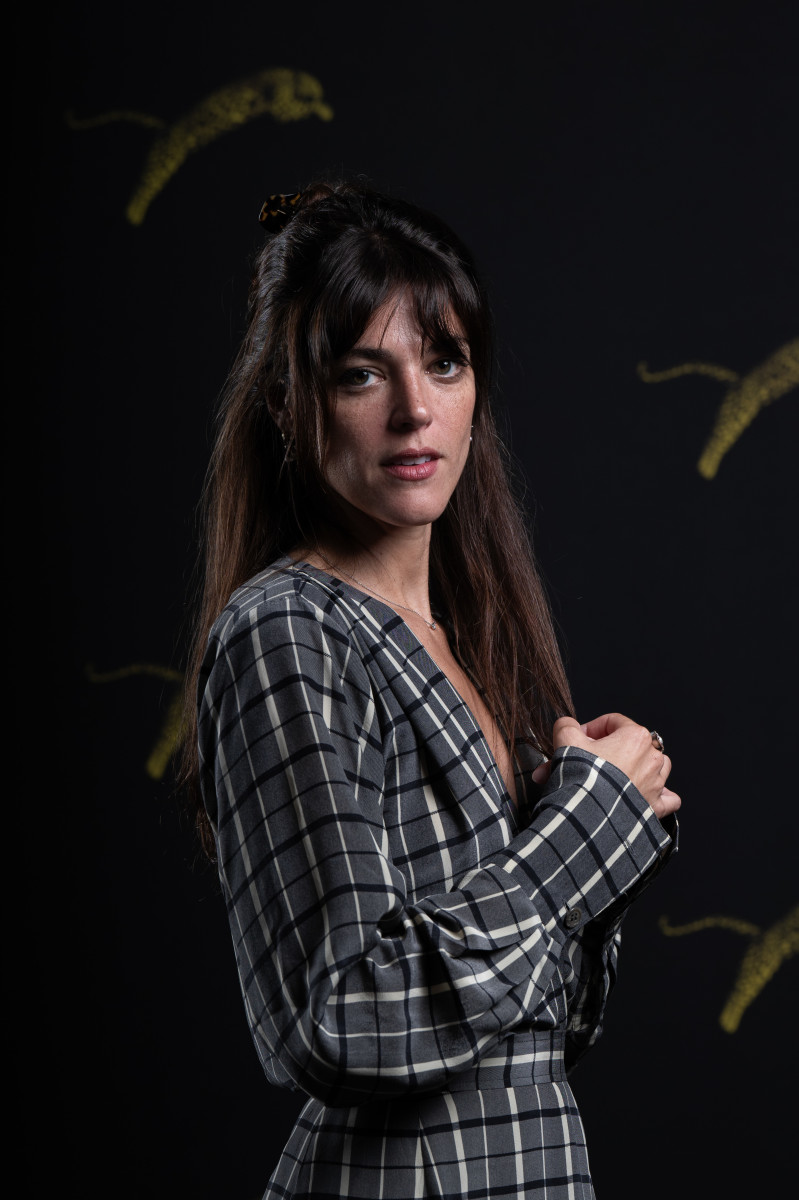In this wide-ranging talk, ‘Invention’ filmmakers Courtney Stephens and Callie Hernandez discussed their collaboration, mixing genres, shooting a low-budget Super 16 film, making a ‘dead dads’ project, and so much more.
Susan Kouguell – Senior Contributing Editor Script Magazine
Aug 26, 2024
It was a pleasure to speak with Courtney Stephens and Callie Hernandez at the Locarno Film Festival where their film Invention had its debut, and Callie was awarded Best Performance at the Locarno in Concorso Cineasti de la Presente. In our wide-ranging talk, we discussed their collaboration, mixing genres, shooting a low-budget Super 16 film, making a ‘dead dads’ project, and so much more.
About Invention
In the aftermath of a conspiracy-minded father’s sudden death, his daughter inherits his patent for an experimental healing device. Featuring archives from Callie Hernandez’s late father, Invention explores the process of grieving a complicated parent, and the filmmaking itself becomes a part of the process.
“Having both lost our dads, We wanted to explore the fictions and fantasies that often follow loss and allow us to bear disappointment – both as individuals and as a public in times of national decline.” – Courtney Stephens and Callie Hernandez
About the Filmmakers
Courtney Stephens is a Los Angeles-based writer and director. The American Sector, her documentary (co-directed with Pacho Velez) about fragments of the Berlin Wall transplanted to the U.S., was named one of the best films of 2021 in The New Yorker. Her essay film, Terra Femme, comprised of amateur travel footage shot by women in the early 20th century, premiered at the Museum of Modern Art and toured widely as a live performance. She is the recipient of a 2022 Guggenheim Fellowship and a Fulbright Scholarship to India. Invention is her first fiction film.
Callie Hernandez is an actress, writer, filmmaker and producer with work spanning over a decade. She was recently awarded Best Performance at Locarno in Concorso Cineasti de la Presente for Invention in August 2024. After starting out in music as both a cellist and in experimental punk bands in Texas, she found herself acting in her first role in Terrence Malick’s Song to Song. Later acting work includes Ridley Scott’s Alien: Covenant, Damien Chazelle’s La La Land, A24’s Under the Silver Lake, Pete Ohs’ JETHICA among others. In 2022, she founded Neurotika Haus Films, an in-house film studio, which yielded INVENTION, and longtime collaborator Pete Ohs’ upcoming dark comedy Untitled Tick Movie produced with Jeremy O. Harris. Her upcoming project is an Untitled Erotica Anthology.

The Interview
Kouguell: Invention is credited as “A film by Callie Hernandez and Courtney Stephens”: you wrote the script together. Tell me about your writing process and your collaboration.
Hernandez: The process was very collaborative. We were into the idea of making a film together. And it really all began when it felt right to make a “dead dads” film. Making a film about my dad’s niche medical realm, the machines he collected and his VHS archive was something I’d wanted to make. So eventually, our film became more in line with that idea as we developed it.
Stephens: When we started talking about it, the project was going to be much more of a straight fiction, exploring the aftermath of losing a father. Then Callie shared elements of her own dad’s world, which was fascinating and specific, and I was drawing from the process of dealing with my own dad’s failing business affairs after he died, and this kind of composite of our experiences took shape to form the fiction elements of the film.
Kouguell: Particularly striking is the film genre; it successfully serves this unconventional (experimental) narrative film. Would you define it as a fiction and documentary hybrid?
Hernandez: The narrative is definitely fictionalized and there are a lot of true elements. My dad didn’t invent a medical device — he collected them. This film is an experiment, maybe. It premiered at Locarno as a fiction and much of the narrative is highly fictionalized, but there are a lot of very close, true elements in the film. For example— my dad did not invent a medical device, but the electromagnetic healing machines are definitely something he collected and became central to the narrative. It’s a deeply personal fiction, I suppose.
Kouguell: Courtney, you’ve worked in both narrative and documentary. As the co-writer and director on Invention did your approach to the project change as it evolved?

Stephens: I think it meandered further into non-fiction as we worked, but it was exciting to work backwards: starting with the idea of fiction and then kind of documenting the creation of that fiction and drawing real stories out as we went along. I have an MFA in screenwriting from the AFI, but had gone on to make more experimental and essay films, so it was interesting to apply lessons learned in those realms to fiction.
In the film, we were working from an outline rather than a fixed script, with the exception of a few scenes. So there was definitely an element of working out these kinds of testimonies with the actors about who Carrie’s dad was, knowing they would be puzzled together into something that feels like this fractured portrait.
Kouguell: Callie, you have an extensive background as an actress, and you also starred in this film. How did this inform the writing process, and the incorporation of archival footage of your late father, promoting and discussing his inventions?
Hernandez: Yes, so, as I mentioned before, my dad did not invent these types of machines, but he had dozens. With some of them, one must be licensed by the inventor in order to purchase and use the machine. They range anywhere from $2k-$17k. So, my dad was an MD turned holistic healer in the early 90s. He was a hypnotist at one point, a monk in Bhutan at another point. After he died, my sister and I sort of re-discovered all these beautiful machines that we’d been privy to growing up with him, of course.
I knew his archive existed, but was surprised to find it all in one place in a storage unit. I shared these VHS tapes with Courtney and, then, slowly it felt like — ‘OK, yes, this is the film we’re making.’
Yes, acting has been my bread and butter for the most part for about a decade. I was acting in a TV show right after my dad died. In fact, I went straight to work after his funeral. I didn’t tell anyone. My dad’s death in combination with a mounting curiosity about making my own films led to my renting a house in Massachusetts with the intention of making my own films. As my good friend Pete Ohs put it, I was done with only acting.
That said, I studied doc photography and journalism in college, so these things are probably engrained. Making films and writing have always been every day for me — I’ve always done it since I was in my teens. I really just like making films in general. It’s all intertwined for me.
Kouguell: This footage is both powerful and humorous, subtly underscoring mythology and the American Dream, Anything is possible or is it? There is a layered tone of hopeful optimism and disappointment when it comes to Callie discovering who her father was and wasn’t. Please talk about this.
Hernandez: There’s a lot of mundane tasks involved when dealing with a death. Many of the characters in the film are very similar to interactions my sister and I have had with people surrounding my dad’s death.
But I think this speaks to a larger idea of conspiracy as a form of grief. We wanted to explore conspiracy and its origins. There’s both hopefulness and hopelessness, and a desperation in both.
Carrie faces a very fragile reality. She’s pulled toward her dad because he’s gone. She’s left with this essence of irrevocability and unanswerable questions. So her skepticism, over time, gets braided into a sense of hope or lack thereof. It’s about irreversibility, I suppose. This is what interested me most in making the film. Irreversibility and the things we try to change in real time that we absolutely cannot. But, for whatever maddening reasons, we do try.
Stephens: Yeah, we were thinking a lot about the nature of belief and especially how porous that becomes when one is in crisis. My sense is that America is on that same kind of shaky ground, in which something was promised, and people feel let down. It’s often so much easier to find a story in which things are not what they seem, or there is some secret adversary or obstacle, than it is to process the fact that you’ve been let down, that there’s nothing but disappointment.
Kouguell: Grief, one of the themes of the film, is something you both experienced, losing your respective fathers. It’s the catalyst of the plot yet you don’t fall into predictable tropes or a neat and tidy ending.
Hernandez: We exchanged books in the beginning. I gave Courtney Pitch Dark by Renata Adler, and Courtney gave me Basic Black with Pearls by Helen Weinzweig. We found that the books were pretty eerily similar; women inventing – or maybe not at all inventing – wild circumstances during a time of foundational loss. There’s something primordial about this state of mind. There’s a push and pull as you un-become yourself, in a way. You are suddenly, without consent, fundamentally different than you were before. We both lost our dads pretty suddenly. You’re very quickly haunted when this happens. So, this was also a part of why we wanted to make the film together, I think. This shared understanding.
Stephens: In a sense the construction of the film – and this word Invention – are, in a positive sense I think – exploring ways of changing the shape of grief through fiction. Maybe it goes back to the question of genre and the self-reflexivity of the film. The encounters in the film are building the character of the absent dad in ways that are contradictory, and that’s OK within the space of the film for these contradictions to exist, because we’re always acknowledging that they are these fictional propositions, so it’s an exercise in character. But in life, we want it to all add up, and it often doesn’t, it’s just layers upon layers, and that’s what we hoped to depict, rather than a linear process.
Kouguell: The actual invention or one of them, is about healing ‘energy’ – can you delve into this more?

Hernandez: There’s a great deal of specifics in terms of electromagnetic frequencies, energy and lasers, etc that are commonly argued as scientific approaches in the medical industry. It varies in terms of meaning. I think the term “healing” has developed its own, vastly varying implications.
My dad didn’t invent this (or any) machine (to my knowledge), but he had dozens. He believed in electromagnetic healing and lasers and frequencies. He was a big believer in energy, and even more so a believer in general. In reptilians. In parallel universes. Energy was always his core belief, both as a doctor and as a person. At one point, he lined the perimeter of our house in copper. We had copper pyramids in our backyard.
Then, of course, his interest in hypnosis, devices, etc. It’s true that, by the end of his life, he was selling these types of energetic healing devices for a company out of Utah. He really did use them demonstratively on feral cats in an attempt to show their increasing domestication. He was living with his girlfriend in their trailer in Texas and they had 17 cats at one point — all with names that began with ‘B.’ All of this to say, this type of medical technology is pretty niche, but varied. At the same time, there is a unique point where all these very specific interests intersect.
Kouguell: You shot on Super 16 on a shoestring budget. I imagine this also informed specific choices you made during the filming – both positive and negative.
Stephens: Trying to work out improvisational scenes while burning through limited rolls of film – I don’t recommend it! But it forced us to shape the scenes there and then rather than just exploring out loud with the hope of finding the film later on, a process which would have yielded something more impressionistic. The visual language of the film is quite direct and almost old-fashioned, and I think this helps given the abstract nature of some of the things we were exploring.
Hernandez: Definitely. I think we couldn’t imagine shooting this on anything but film. There was a moment we considered otherwise, but it didn’t feel right. And, of course, we knew the limitations of using film, which gives you an engine to keep pushing through with these limited resources. You have a limited amount of film and time to hone in on what’s important. But, yes, there are definitely pros and cons. A shoestring budget indeed. All out of pocket. We were the crew. It’s simpler, but not easier.
Kouguell: Final thoughts on your film that you would like to share?
Stephens: Thanks for the great questions! In film school, they will tell you “Raise the stakes!” Our film is small and kind of gentle, but the stakes for us were really high— our dad’s who we loved and these really difficult experiences in our lives. So the nice reception to the film gives me faith in what can be transmitted through cinema without too many resources.
Hernandez: I actually shot four films in this same house that I’d rented in Massachusetts with the intention of making micro-budget films that no one would ever really ‘allow’ us to make. This film idea was the one that felt closest to the things that I hope to continue making films about. Again — making films this way is simpler, not easier. But I like hard work.
Invention probably wouldn’t exist without this partnership between Courtney and myself. Yes — the responsibility I felt in terms of my dad, incorporating his VHS archive and machines and the overall essence of the film was huge. My sense at the beginning was that Courtney was the right person to collaborate with. And I think this instinct was right.
Read more: Interview with ‘Invention’ Filmmakers Courtney Stephens and Callie Hernandez at the 2024 Locarno Film FestivalRead more: Interview with ‘Invention’ Filmmakers Courtney Stephens and Callie Hernandez at the 2024 Locarno Film FestivalRead more: Interview with ‘Invention’ Filmmakers Courtney Stephens and Callie Hernandez at the 2024 Locarno Film Festival